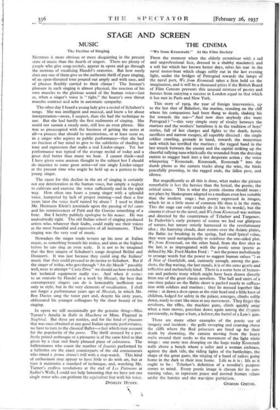"We from Kronstadt." At the Film Society
THE CINEMA
FROM the moment when the elderly commissar with a sad and unprofessional face, dressed in a shabby macintosh and a soft hat which has known better days, takes his seat in the naval motor-boat which chugs softly out in the last evening light, under the bridges of Petrograd towards the lamps of the naval port, We from Kronstadt takes a firm hold on the imagination, and it will be a thousand pities if the British Board of Film Censors prevents this unusual mixture of poetry and heroics from enjoying a success in London equal to that which it has met in Paris and New York.
This story of 1919, the year of foreign intervention, up to the last shot of Balashov, the marine, standing on the cliff where his companions had been flung to death, shaking his fist towards the sea—" And now does anybody else want Petrograd ? "—this very simple story of rivalry between the marines and the workers' battalions is in the tradition of boys' stories, full of last charges and fights to the death, heroic sacrifices and narrow escapes, all superbly directed : the single soldier crawling, grenade in hand, towards the monstrous tank which has terrified the marines ; the ragged band in the last trench between the enemy and the capital striking up the cheerful rallying tune which calls the wounded from the dressing station to stagger back into a last desperate action ; the voice whispering " Kronstadt, Kronstadt, Kronstadt " . into the dumb phone as the camera tracks along the wire, the birds peacefully preening, to the ragged ends, the fallen post, and silence.
But magnificently as all this is done, what makes the picture remarkable is less the heroics than the lyrical, the poetic, the critical sense. This is what the poetic cinema should mean : not plays by Shakespeare adapted to a medium even less suitable than the modern stage ; but poetry expressed in images, which let in a little more of common life than is in the story,. This the stage can only crudely do (it has its words), but. the cinema is closer to the novel, and We from Kronstadt was written . and directed by the countrymen of Tchehov and Turgenev. In Pudovkin's early pictures of course we had our glimpses of nature, but nature strictly harnessed to the revolutionary idea ; the hurrying clouds, dust storms over the Asiatic plains, the Baltic ice breaking in the spring, had small lyrical value, they were used metaphorically to reinforce the one-sided plot. We from Kronstadt, on the other hand, from the first shot to the last, is as impregnated with the poetic sense (poetic as defined by Mr. Ford Madox Ford : " not the power melodiously to arrange words but the power to suggest human values ") as A Nest of Gentlefolk, and, curiously enough, among the gun- shots, the flag waving, the last stands, it is of the same gentle and reflective and melancholy kind. There is a scene here of humor- ous and pathetic irony which might have been drawn directly from one of the great classic novelists. The hall and stairs of a one-time palace on the Baltic shore is packed nearly to suffoca- tion with soldiers and marines ; they lie massed together like swine : at dawn a door opens at the stair head and a little knot of children, lodged for safety in the palace, emerges, climbs softly down, ready to start like mice at any movement. They finger the reVolvers, the rifles, the machine guns, climb quicklY away when a man moves, percolate down again among the sleepers persistently, to finger a butt, a holster, the barrel of a Lewis gUn.
There are many other examples of the poetic use of imagery and incident : the gulls sweeping and coursing above the cliffs where the Red prisoners are lined up for their death by drowning, the camera moving from the heavy rocks around their necks to the movement of the light white wings : one sooty tree drooping on the huge rocky Kronstadt walls above a bench where a sailor and a woman embrace, against the dark tide, the riding lights of the battleships, the shape of the great guns, the singing of a band of sailors going home in the dark to their iron home. Life as it is : life as it ought to be : Tchehov's definition of a novelist's purpose comes to mind. Every poetic image is chosen for its con- trasting value, to represent peace and normal human, values under the heroics and the war-titne patriotism.
GRAHAM GRIE..


















































 Previous page
Previous page